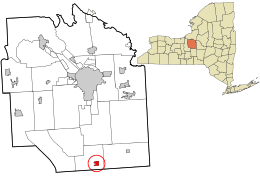Tully (village), New York facts for kids
Quick facts for kids
Tully, New York
|
|
|---|---|

Location in Onondaga County and the state of New York.
|
|
| Country | United States |
| State | New York |
| County | Onondaga |
| Government | |
| • Type | Village Board |
| Area | |
| • Total | 0.73 sq mi (1.89 km2) |
| • Land | 0.73 sq mi (1.89 km2) |
| • Water | 0.00 sq mi (0.00 km2) |
| Population
(2020)
|
|
| • Total | 904 |
| • Density | 1,236.66/sq mi (477.79/km2) |
| Time zone | UTC-5 (Eastern (EST)) |
| • Summer (DST) | UTC-4 (EDT) |
| FIPS code | 36-75627 |
Tully is a small village in Onondaga County, New York, in the United States. In 2020, about 904 people lived there. The village gets its name from Marcus Tullius Cicero, a famous speaker from ancient Rome. Tully is located in the southeastern part of the larger town of Tully. It is also south of the city of Syracuse.
History of Tully
The area where Tully is located was once part of the Central New York Military Tract. This was land set aside for soldiers after the American Revolutionary War. The first settlers from outside the area arrived around 1795. Tully officially became a village in 1875.
Where is Tully?
Tully is located at 42°47′51″N 76°6′23″W / 42.79750°N 76.10639°W. This is its exact spot on a map.
The village covers a total area of about 0.6 square miles (1.7 square kilometers). All of this area is land. Tully is situated on U.S. Route 11. It is also at the intersection of New York State Route 80.
Tully's Population
| Historical population | |||
|---|---|---|---|
| Census | Pop. | %± | |
| 1880 | 434 | — | |
| 1890 | 498 | 14.7% | |
| 1900 | 574 | 15.3% | |
| 1910 | 551 | −4.0% | |
| 1920 | 477 | −13.4% | |
| 1930 | 680 | 42.6% | |
| 1940 | 719 | 5.7% | |
| 1950 | 744 | 3.5% | |
| 1960 | 803 | 7.9% | |
| 1970 | 899 | 12.0% | |
| 1980 | 1,049 | 16.7% | |
| 1990 | 911 | −13.2% | |
| 2000 | 924 | 1.4% | |
| 2010 | 873 | −5.5% | |
| 2020 | 904 | 3.6% | |
| U.S. Decennial Census | |||
As of the 2020 census, 904 people lived in Tully. In 2000, there were 924 people living in the village. There were 404 households, which are groups of people living together. About 242 of these were families.
The population density in 2000 was about 1,432.6 people per square mile. This means many people lived in a small area. There were 431 housing units, like houses or apartments.
In 2000, about 26.4% of the people were under 18 years old. About 12.9% were 65 years old or older. The average age in the village was 35 years.
Schools in Tully
Education in Tully has a long history. The first school was started by Miss Ruth Thorpe in Timothy Walker's barn in 1801. The school district received its first official permission to form a high school in 1898.
The Tully school district became a centralized school in 1930. This means different smaller schools joined together. The centralized school was located in the building that is now the elementary school. Both younger students and high schoolers attended classes in the same building.
See also
 In Spanish: Tully (villa) para niños
In Spanish: Tully (villa) para niños

